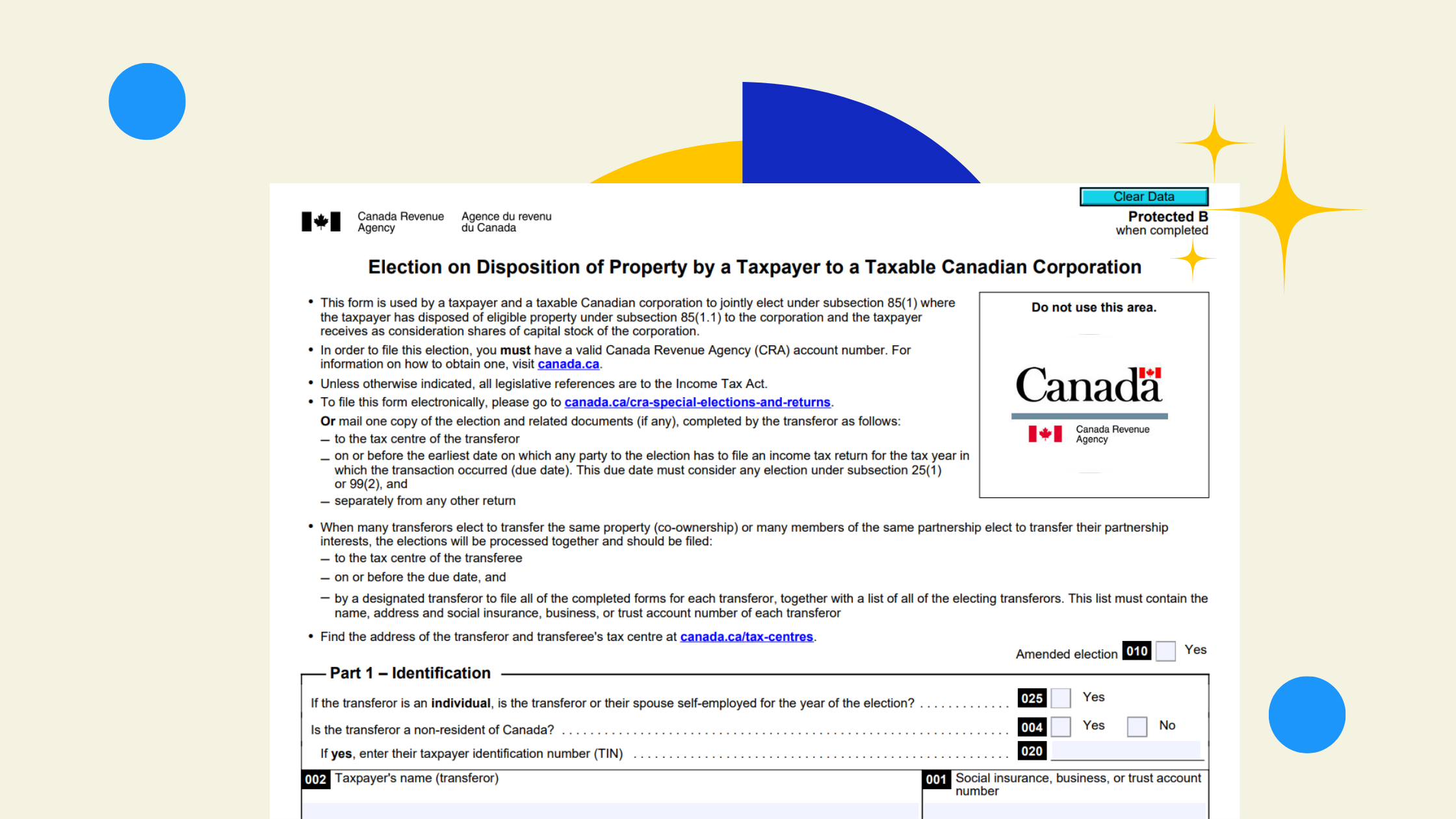Running payroll in Quebec can feel like decoding a different language — especially when it comes to vacation entitlements (indemnité de vacances).
Between federal standards, provincial labour laws, payroll deductions, and software quirks, many small business owners find themselves unsure about how much they actually owe - and when to pay it.
This guide walks through everything you need to know as a Quebec employer - from understanding who qualifies, to how to calculate correctly, to ensuring full legal compliance throughout the vacation period.
What Is Vacation Pay
You can think of vacation pay as the amount you pay an employee when they take their annual vacation leave. It’s a legal entitlement designed to make sure employees are paid while taking time off. In Quebec, it is considered employment income and is subject to income tax withholding. With that said, it's important to
The amount is calculated as a percentage of the employee’s gross earnings during a qualifying period, usually a 12-month reference year. The rate depends on how long the employee has worked for you:
- 4% of gross wages for employees with less than 3 years of service (equal to two weeks of vacation)
- 6% of gross wages for employees with 3 or more years of service (equal to three weeks of vacation)
The amount can be paid:
- When the employee takes their annual leave
- On each pay period, or
- At the end of employment for any unused balance
It’s important to note that in Quebec, sick leave and vacation pay are completely separate under different sections of the Act respecting labour standards (ALS).
And no - vacation pay isn’t the same as paid time off (PTO) - and it does not include maternity leave or paternity leave, which are covered by separate provisions under the ALS and the Quebec Parental Insurance Plan (QPIP).
What’s Included in Vacation Pay
The amount is based on the employee’s gross earnings— meaning regular earnings received for work performed. Include:
- Regular hourly or salaried pay
- Overtime pay
- Commissions and bonuses tied to performance or sales
- Statutory or public holiday payments
- Shift premiums
- Piecework or production pay
These all represent compensation for active work — the foundation for calculating the correct vacation pay under Quebec’s legal framework.
What’s Not Included in Vacation Pay
Here’s where employers must be careful. The following payments must be excluded from the gross wage base when determining vacation entitlements or vacation leave quota.
1. Reimbursements and allowances
Anything paid to cover business costs or tools isn’t part of earnings.
Examples include:
- Meal, mileage, hotel, or parking reimbursements
- Tool or equipment allowances
- Per diems for travel
These are cost recoveries, not wages.
2. Employer-paid benefits
Perks that aren’t direct compensation don’t count:
- Employer contributions to health, dental, or RRSP plans
- Group insurance premiums
- The value of a company car or phone for personal use
Even though taxable, these are not considered “vacationable” earnings.
3. Termination-related payments
Vacation pay only applies to earned wages, not one-time severance.
- Indemnity in lieu of notice (termination pay)
- Severance pay
- Retirement or end-of-service bonuses
You still owe the correct amount on regular wages earned before termination, but not on these indemnities.
4. Unused sick or personal day payouts
If your company pays out unused sick or personal days at year-end, that payout isn’t part of the entitlement. It’s discretionary.
5. Tips and gratuities (not employer-controlled)
Tips received directly from customers — not processed through payroll — are excluded. Only employer-controlled tip pools distributed through payroll count toward the base.
6. QPIP, EI, and other social benefits
When an employee receives payments through government programs (e.g., maternity, parental, or caregiving benefits), these are not wages. Vacation time may continue to accrue, but pay does not.
7. Bonuses unrelated to performance
Bonuses that aren’t tied to work output — such as a Christmas gift or signing bonus — aren’t included. CNESST distinguishes between:
- Performance-based bonuses (included)
- Non-performance bonuses (excluded)
8. Unpaid Vacation or other leaves
If an employee takes unpaid vacation, unpaid parental, or personal leave, no wages are earned during that period. Vacation time continues to accrue, but no additional pay is calculated.
9. Retroactive or lump-sum adjustments
Retroactive pay raises may not be included if they aren’t tied directly to hours worked, depending on payroll software configuration and CNESST interpretation.
Who Gets Vacation Pay in Quebec
In Quebec, every employee covered under the Act respecting labour standards is entitled to vacation pay — whether they're a full-time employee, part-time employee, hourly employee, or salaried employee.
✅ Eligible employees
- Permanent, contract, and seasonal workers
- Hourly or salaried employees
- Commission-based staff
- Part-timers (even those with irregular schedules)
🚫 Not typically covered
- Self-employed contractors
- Federal employees under federal jurisdiction (see next section)
Even during probation, this entitlement accrues from day one. The reference year — or vacation period — typically starts on the employee’s hire date unless otherwise documented.
Federal Rules
If your business is federally regulated (banking, telecommunications, interprovincial transportation), your team falls under the Canada Labour Code (CLC) instead of Quebec’s ALS.
Under the CLC:
- After 1 year: 2 weeks (4%)
- After 5 years: 3 weeks (6%)
- After 10 years: 4 weeks (8%)
It’s calculated on total wages (including overtime and commissions) from the previous year.
The Code also requires that:
- Employers grant vacation within 10 months after entitlement, and
- The payment be made at least one day before the employee’s leave begins.
These federal standards reinforce the same principles of legal compliance — timely pay, accurate calculations, and proper record-keeping.
Quebec-Specific Rules
Quebec’s approach mirrors federal law but adds a few key distinctions that employers must respect for local compliance.
Reference Year
Quebec typically uses May 1 to April 30 as its vacation period, though you can set a custom reference year (for example, aligning with your fiscal year or employee start dates).
Vacation Pay Entitlement
Employees earn vacation based on their years of uninterrupted service with the employer:
- Less than 1 year: no vacation time, but one day per month worked (up to two weeks)
- 1 – 3 years: 2 weeks (4% of gross wages)
- 3 + years: 3 weeks (6% of gross wages)
What Counts Toward Gross Wages
Include regular pay, overtime, commissions, performance bonuses, public holiday payments, and piecework compensation. Exclude reimbursements, tips not controlled by the employer, and termination pay.
When to Pay
Payment must occur at the start of the employee’s annual leave, unless both parties agree otherwise in writing. If you pay the entitlement on each pay period, that arrangement must also be documented.
Carrying Over Unused Time
Unused vacation time generally can’t be replaced by cash unless employment ends or the employee agrees in writing under exceptional circumstances.
Ensuring legal compliance here is essential — errors in timing or calculation are among the most common triggers for CNESST complaints.
How to Calculate Vacation Pay in Quebec
Most errors happen not because the math is complex, but because employers confuse vacation pay (the money) with vacation time (the leave).
Step 1: Determine the employee’s gross wages for the reference year
Include base pay, overtime, commissions, performance bonuses, and public holiday pay.
Example: If an employee earned $60,000, that’s your starting point.
Step 2: Apply the correct percentage
- 4% if employed less than 3 years
- 6% if employed 3 years or more
Example:
- $60,000 × 4% = $2,400
- $60,000 × 6% = $3,600
Step 3: Adjust for partial service
If the employee worked only part of the reference year, prorate the entitlement.
Example: $25,000 × 4% = $1,000
Step 4: Decide when to pay
Options: lump-sum before vacation, incremental each pay period, or upon termination. Keep consistent and documented.
Step 5: Record it properly
Show total entitlement earned, paid, and remaining balance. Payroll software like Wagepoint or QuickBooks automatically tracks balances and applies payroll deductions correctly.
Example 1 – Hourly Employee
Employee: Sara
Hourly rate: $20 /hour
Hours: 2,000 /year → $40,000 gross
Tenure: 2 years
Calculation: $40,000 × 4% = $1,600
Sara receives two weeks of paid vacation worth $1,600.
Example 2 – Salaried Employee
Employee: Marc
Salary: $75,000 /year
Tenure: 4 years
Calculation: $75,000 × 6% = $4,500
Marc earns three weeks off valued at $4,500.
Example 3 – End of Employment
Employee: Lina
Salary: $50,000 /year
Tenure: 1.5 years
Unused time: 2 weeks
Calculation: $50,000 × 4% = $2,000
Include this in her final pay with other outstanding wages.
On a side note, the Government of Canada offers an online vacation pay calculator that helps estimate the minimum entitlement for employees working in federally regulated industries or standard employment situations. However, if your workplace is governed by a collective agreement, the specific terms of that agreement may differ — in that case, it’s best to confirm details with your union representative.
How to Pay Employees
So, you’re ready to issue an employee’s vacation pay — simple enough, right? Then you come across the Source Deduction Table for Québec Income Tax (TP-1015.TI-V) and all those unfamiliar schedules.
Here’s why it matters: in Quebec, vacation payments are subject to income tax withholding, just like regular wages. The tax you need to withhold depends on two things — the percentage of the payment and whether the employee is actually taking time off.
The deduction tables exist to help you withhold approximately the right amount by treating the vacation payment as if it represents a specific number of weeks of pay.
Here's the general rule of thumb:
- 2% vacation pay ≈ 1 week of pay
- 4% ≈ 2 weeks
- 6% ≈ 3 weeks
- 8% ≈ 4 weeks
When the employee is taking vacation You calculate Québec income tax on the vacation pay as if you’re paying them for that many weeks at once. That’s why the schedules change:
- If it’s 2% (one week): Use Schedule A (53 pay periods) or Schedule B (52 pay periods). Pick the one that matches your weekly payroll calendar for that year.
- If it’s 4% (two weeks): Use Schedule C (27 pay periods) or Schedule D (26 pay periods). These are the biweekly tables—again, pick the one that matches your pay calendar.
- If it’s 6% (three weeks): Divide the total payment by 3 to get a “weekly” amount. Find the tax on that amount in Schedule B (52 pay periods), then multiply that tax by 3.
- If it's 8% (four weeks): Same logic — divide by 4, look up the weekly withholding in Schedule B, and multiply by 4.
Why the divide-and-multiply trick? Because Revenu Québec doesn’t provide “three-week” or “four-week” schedules. You’re effectively converting a lump sum into weekly equivalents to calculate the right source deductions.
Once you know the amount, the next step is execution — and legal compliance matters here.
Option 1: Pay Before Vacation
The most common and compliant approach. Pay the full entitlement before the employee’s vacation period begins so they have funds during their time off.
Option 2: Pay with Each Pay Period
Common for hourly or casual staff. Add 4% or 6% to each pay and show it separately on the pay stub. Written consent is required.
Option 3: Pay at Termination
If an employee leaves with unused vacation holidays, pay the full accrued balance on the final cheque, including prior-year carryovers.
Option 4: Include in Regular Salary
For true salaried employees, the entitlement may be built into their annual regular salary — but you still must track and report it clearly.
Quebec Statutory Holidays and General Holidays
Statutory holidays (“jours fériés”) are separate from vacation time, but they affect calculations. Quebec recognizes eight general holidays:
- New Year’s Day (January 1)
- Good Friday or Easter Monday (employer chooses)
- National Patriots’ Day (Monday before May 25)
- Québec’s National Holiday (June 24)
- Canada Day (July 1)
- Labour Day (first Monday of September)
- Thanksgiving (second Monday of October)
- Christmas Day (December 25)
If a statutory day falls during an employee’s vacation holidays, they’re entitled to an additional day later or separate payment for that holiday.
Common Employer Mistakes
- Paying only upon request instead of at the start of leave
- Forgetting to include commissions or performance bonuses in the base
- Substituting payment for time off (not allowed except at termination)
- Failing to record balances or vacation leave quotas properly
- Excluding part-timers who still qualify
- Misreporting payroll deductions tied to vacation payments
Proper documentation and adherence to CNESST guidelines prevent compliance penalties.
FAQs
1. Do I have to pay if the employee quits?
Yes — all earned and unused balances must be paid on the final cheque.
2. Does overtime count toward the entitlement?
Yes — it’s part of gross wages.
3. Can employees carry over unused days?
Generally no; the time must be used within 12 months after the reference year.
4. Can I pay the entitlement with each pay?
Yes, if there’s written consent and it appears clearly on the pay stub.
5. What if the employee is on unpaid leave?
If there are no earnings (e.g., unpaid vacation or leave), no pay accrues, though time may continue to accrue.
Tools to Simplify Calculations
Manual tracking often leads to mistakes. Software such as Wagepoint or QuickBooks Online Payroll can:
- Track hire dates and reference years
- Accrue 4% or 6% automatically
- Manage vacation leave quotas
- Apply correct payroll deductions
- Generate CNESST-ready compliance reports
Final Thoughts
This entitlement isn’t just a line item — it reflects how your company values its team while staying compliant with Quebec’s employment standards.
Because Quebec payroll involves overlapping rules for vacation holidays, public holiday payments, and deductions, mistakes can quickly become costly.
At Mesa CPA, we help small businesses automate payroll, manage vacation entitlements, and maintain legal compliance - so you can focus on growth instead of red tape.
If you’re ready to simplify your payroll and stop worrying about statutory holidays or vacation accruals, reach out for a quick compliance review. We’ll make sure every vacation period, deduction, and record meets Quebec standards - accurately and on time.



.png)

